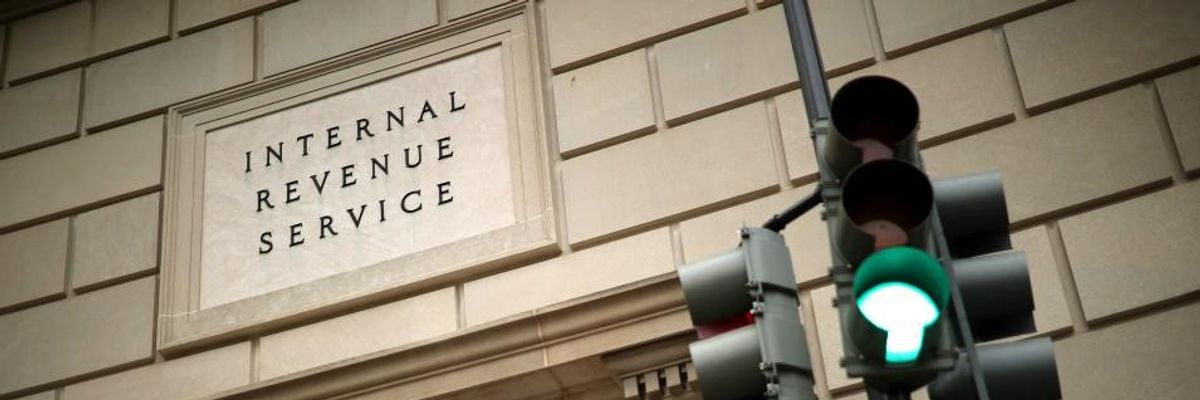Economic justice advocates are urging House Democrats to do more to defend Internal Revenue Service funding after leaders of the minority party agreed to Republican draft legislation that would continue a freeze on more than $20 billion in IRS modernization and enforcement funds in order to avert a government shutdown.
The $20.2 billion freeze is part of a continuing resolution that would guarantee funding for the federal government through March 14. Although the Inflation Reduction Act signed into law by President Joe Biden in August 2022 allocated $80 billion in supplemental funding to the IRS, Congress subsequently rescinded $21.6 billion of that and added a rider for the $20.2 billion freeze in an earlier continuing resolution.
The freeze means that the funds are neither permanently rescinded nor available for use. According to the Institute on Taxation and Economic Policy, the effective $20.2 billion funding reduction would increase the federal deficit by $46 billion "due to a drop in the agency's capacity to enforce taxes on wealthy individuals owed under existing federal law."
As Dylan Gyauch-Lewis wrote Wednesday for The American Prospect, "For the second straight year, President Biden and the Democrats are poised to sacrifice a significant chunk of one of their biggest accomplishments: funding for the IRS to go after wealthy tax cheats."
"With the latest maneuver, more than 90% of the money invested to scale up IRS auditing and oversight could be gone before it can even be used," Gyauch-Lewis added. "Yet again, Democrats seem to have been outplayed by Republican leadership."
Conversely, the infusion of IRA funding has boosted IRS recovery of unpaid taxes.
"The IRS has collected $4.7 billion in back taxes from wealthy tax cheats thanks to funding from the Inflation Reduction Act," Groundwork Collaborative executive director Lindsay Owens said in a statement Wednesday. "But since its passage, Republicans have clawed back nearly half of the enforcement budget to make it easier for the ultra-wealthy to get away with not paying their share."
Democrats helped this happen. In order to secure a 2023 debt ceiling deal with then-House Speaker Kevin McCarthy (R-Calif.), Biden agreed to multi-year spending caps in the so-called Fiscal Responsibility Act, as well as the $21.6 billion IRS funding recision. Now it is uncertain whether the outgoing Biden administration or congressional Democrats will fight to defend IRS funding or once again acquiesce to GOP cuts in order to keep the government running.
IRS Commissioner Danny Werfel warned during a recent media call that Republicans' proposed cuts to the agency's funding would "be critically damaging to our capacity to do the work we need to do to make sure that large corporations and complex partnerships are paying what they owe."
Owens said "it's clear congressional Republicans are paving the way for the Trump administration to make it open season for tax cheats."
Such fears mounted this month after Republican President-elect Donald Trump tapped former Rep. Billy Long (R-Mo.) to head the IRS. Long sponsored multiple bills to dismantle the IRS and legislation to repeal all estate taxes, which are overwhelmingly paid by the wealthiest Americans. He has also promoted a dubious pandemic-era tax credit that the IRS has called a magnet for fraud.
"Even before the new administration takes office, we are seeing Republicans take steps to hamstring the IRS to ensure the ultra-wealthy can continue to evade their taxes," Anna Aurilio, senior director of campaigns at Economic Security Project Action, said in a statement Wednesday.
"A well-funded IRS is vital to administering a fair tax code. Slashing funding for the agency, which recently collected nearly $5 billion from wealthy tax evaders and crime rings, only hurts the efficiency and efficacy of the government," Aurilio added. "By starving the agency that helps deliver vital tax credits to the American people, Congress will make it more difficult for people to file their taxes and get the credits they qualify for—all while making it easier for the wealthiest individuals and big businesses to avoid paying their fair share."

